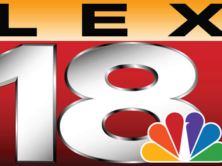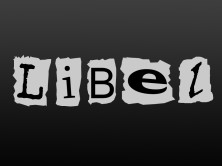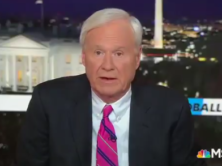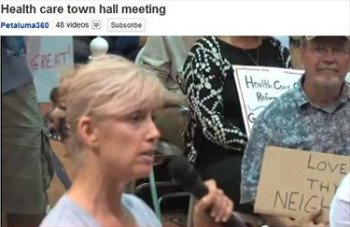
Petaluma360 posted this video on YouTube of a Town Hall meeting (Screenshot). The caption: "Emotional responses during health care reform meeting in Petaluma Monday August 31, 2009." (YouTube, "Petaluma360," Screenshot)
 Two recent polls by CNN and CBS News on the health care law enacted in early 2010 provide counter-intuitive insights into public opinion on this issue: “Opposition” doesn’t necessarily mean what we think; and most people don’t have strong opinions one way or the other on the new law.
Two recent polls by CNN and CBS News on the health care law enacted in early 2010 provide counter-intuitive insights into public opinion on this issue: “Opposition” doesn’t necessarily mean what we think; and most people don’t have strong opinions one way or the other on the new law.
You might assume that by now, the vast majority of people in the United States would have a fixed opinion on that health care law, given the humongous media coverage it has received. And sure enough, a recent CNN poll, conducted June 3-7, reported that 95% of Americans had an opinion on the law, while a CBS News poll, also conducted June 3-7, found 85% with an opinion.
 |
| See above a comparison of the CNN and CBS News polls on the health care law. |
As the chart makes clear, both polls seem to show that on balance, more Americans oppose/disapprove of the new healthcare law than favor/approve it. But each poll approached the subject a bit differently, providing insights that contradict these initial findings.
CNN Poll – Why People Are Opposed
The general assumption seems to be that if people are opposed to the new healthcare law, it’s because they believe the government is too involved in healthcare. But as CNN discovered, many people say they are opposed because the government does not do enough.
CNN’s original question asked:
“As you may know, a bill that makes major changes to the country’s health care system became law last year. Based on what you have read or heard about that legislation, do you generally favor or generally oppose it?”
Among the 56% of respondents who said they opposed the changes, CNN asked:
“Do you oppose that legislation because you think its approach toward health care is too liberal, or because you think it is not liberal enough?”
The results showed that 14% of the respondents were opposed to the law because it was not liberal enough, and only 36% were opposed because the government was too liberal (presumably meaning the government was doing too much in healthcare that it should not be doing). Another 6% didn’t know why they opposed the law.
The 14% group is interesting, because instead of being opposed to too much government involvement, this group wants the government to do more in the area of healthcare coverage. This group could include people who favor a single-payer program, along the lines of Medicare, as well as other people who want to provide more benefits rather than fewer.
If we take the 14% who want expanded benefits, and add them to the 39% who favor the current law, we then find 53% overall who want at least as much government involvement as what the current healthcare law provides, and only 36% who oppose that level of government involvement.
 |
| By incorporating the results of CNN’s follow-up question into CNN’s poll results (left graph), 53% of respondents approve of the current level of government involvement in health care. |
Ideally, CNN would have followed up with another question to the 14% of respondents who opposed the law because it was not liberal enough. The question would be: Which is better – the new healthcare law that wasn’t liberal enough, or no new healthcare law at all?
My assumption is that all, or virtually all, of these respondents would prefer the “imperfect” healthcare law that was passed to not having any new law at all. Still, to be precise, the follow-up question would be instructive.
Support for Repeal?
The CNN follow-up question is key to understanding why polls do not show majorities in favor of repealing the new healthcare law, despite showing either a plurality or majority in opposition to the law.
A recent poll by the Kaiser Family Foundation, for example, conducted May 12-17, asked:
“What would you like to see Congress do when it comes to the health care law?
They should expand the law (30%)
They should keep the law as is (21%)
They should repeal the law and replace it with a Republican-sponsored alternative (19%)
They should repeal the law and not replace it (19%)
[No Opinion] (10%)
A majority, 51%, wanted either to expand the law or keep it as is.
That same poll also asked if respondents approved or disapproved of “cutting off funding [of the new healthcare law] as a way to stop some or all of health reform from being put into place?” By 63% to 33%, respondents opposed cutting funding for the law.
In the previous month, April, CNN had also asked whether lawmakers should cut funds for the law as a way to curtail it:
“Would you favor legislation that would prevent the federal government from spending any money to implement the provisions of the new health care law that was passed last year, or do you think the federal government should continue to provide funding to implement the provisions of the new health care law?”
By a 17-point margin, 58% to 41%, CNN respondents opted to “continue to provide funding” for the law.
The lesson here is that questions that measure “opposition” to policies, without also measuring the reasons for that opposition, can produce a misleading picture of public opinion. The reason some “opponents” of the new healthcare policy don’t want the law repealed is that, whatever its shortcomings, it’s apparently better than no law at all. That nuance gets lost in most reports of polls that show majority opposition to the law.
CBS News Poll Measures Intensity
There is another very different way of viewing public opinion on healthcare — by examining how strongly people feel about their views.
Usually pollsters don’t measure intensity of opinion, but in its June poll, CBS did include such a measure — asking if respondents “strongly” approved/disapproved of the healthcare law, or approved/disapproved “somewhat.”
 |
| Only 47% of CBS poll respondents had strong feelings about the health care law. |
These results suggest that less than half the public has “strong” views either way on the healthcare issue (14% who approve and 33% who disapprove). Is that possible? Or am I treating the “somewhat” responses too lightly?
What Intensity Measures Mean
Last year, my colleague, Andrew Smith, Director of the University of New Hampshire Survey Center, and I reported on some polling experiments conducted by the center. We showed that when people say they don’t feel strongly about an issue, that essentially means they would not be upset if the opposite actually happened.*
That is not as radical as it might sound. On most issues, a significant plurality, if not majority, of the public simply doesn’t have an opinion as to which course of action might be best. People in general are quite willing to defer to elected leaders to make such decisions. After all, that’s how a representative system of government is supposed to operate.
Of course, in poll interviews, when pressed to come up with an opinion, respondents will do so, making it appear as though most people have fixed views on the matter. A more realistic picture of the public is to recognize that “weakly” held views are not the foundation of the public will, but rather a whimsical response that needs to be recognized for what it is – essentially “non-opinion.”
With that in mind, the next graph contrasts the CBS poll results as initially reported with a more realistic picture of what Americans are actually thinking.
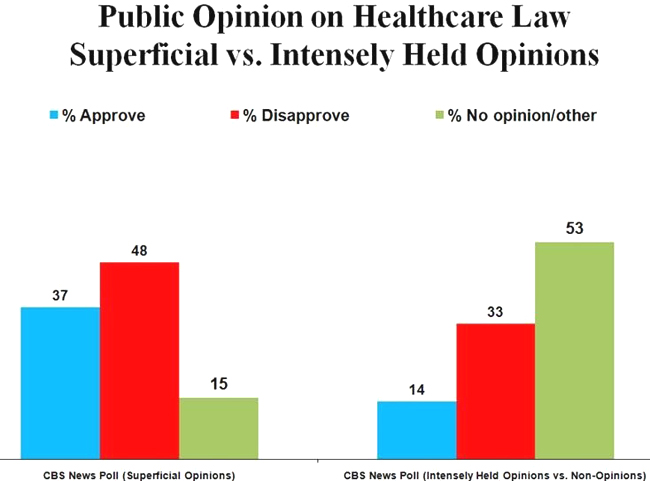 |
| In the case of CBS News’ poll, only 47% of respondents had any strong or “intensely held opinions” about the health care law. |
The right graph shows that there is a core of opponents, about a third of the public, who disapprove of the new healthcare law, while less than half that number – just 14% — strongly support the law. A majority, about 53%, don’t feel strongly one way or the other.
What these results suggest is that most Americans are taking a wait-and-see attitude about the healthcare changes, their support or opposition not to be taken for granted. Perhaps that’s why other polls don’t show a majority of Americans willing to repeal the law right away, or cut funding for it.
As this discussion makes clear, published poll results are not always what they seem.
*“Measuring Intensity of Opinion,” by David W. Moore and Andrew E. Smith, Paper presented at the Annual Meeting of the American Association for Public Opinion Research, Chicago, Illinois, May 13, 2010
David W. Moore is a Senior Fellow with the Carsey Institute at the University of New Hampshire. He is a former Vice President of the Gallup Organization and was a senior editor with the Gallup Poll for thirteen years. He is author of The Opinion Makers: An Insider Exposes the Truth Behind the Polls (Beacon, 2008; trade paperback edition, 2009). Publishers’ Weekly refers to it as a “succinct and damning critique…Keen and witty throughout.”


